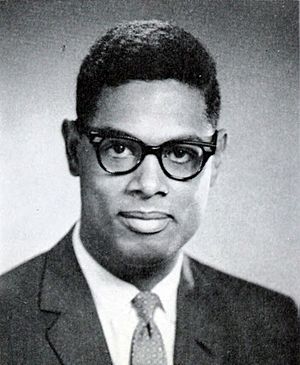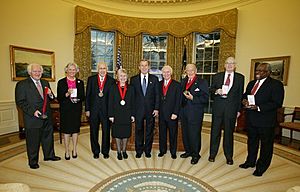Thomas Sowell facts for kids
Quick facts for kids
Thomas Sowell
|
|
|---|---|

Sowell in 1964
|
|
| Born | June 30, 1930 Gastonia, North Carolina, U.S.
|
| Spouse(s) |
Alma Parr
(m. 1964; div. 1975)Mary Ash
(m. 1981) |
| Institutions |
|
| Field |
|
| School or tradition |
Chicago school of economics |
| Doctoral advisor |
George Stigler |
| Influences | |
| Contributions |
|
| Awards |
|
| Military career | |
| Allegiance | |
| Service/ |
|
| Years of service | 1951–1952 |
| Battles/wars | Korean War |
| Signature | |
Thomas Sowell (born June 30, 1930) is an American economist, writer, and social thinker. He is a senior fellow at the Hoover Institution, a research center at Stanford University. Through his many books and articles, he became a well-known voice for conservative ideas in America. In 2002, President George W. Bush awarded him the National Humanities Medal.
Sowell was born in North Carolina and grew up in Harlem, New York City. His family was poor, and he had to drop out of high school to work. He later served in the United States Marine Corps during the Korean War. After the military, he finished his education and graduated with honors from Harvard University in 1958. He went on to earn advanced degrees from Columbia University and the University of Chicago.
As a professor, Sowell taught at several universities, including Cornell University and the University of California, Los Angeles. Since 1977, he has worked at the Hoover Institution, where he researches and writes about public policy.
Sowell has written more than 45 books on topics like economics, politics, education, and race. His ideas are often described as conservative or libertarian, which means he generally supports free markets and individual freedom. He has said he prefers the label "libertarian" but doesn't agree with the movement on every issue.
Early Life and Challenges
Thomas Sowell was born in 1930 in Gastonia, North Carolina, into a poor family. His father died before he was born, and his mother, a housemaid, already had four other children. A great-aunt adopted Sowell and raised him. He remembers living in a small wooden house with no electricity or running water.
When Sowell was nine, his family moved to Harlem, New York City. He was a bright student and was accepted into Stuyvesant High School, a top school in the city. He was the first person in his family to study past the sixth grade. However, due to money problems at home, he had to drop out at age 17.
He worked several jobs, including at a machine shop and as a delivery person. In 1951, he was drafted into the United States Marine Corps during the Korean War. In the Marines, he discovered a love for photography, which became a lifelong hobby. He was honorably discharged in 1952.
Education and Early Career
After the military, Sowell was determined to finish his education. He took a government job in Washington, D.C., and attended night classes at Howard University. His excellent test scores helped him get into Harvard University. He graduated with high honors in 1958 with a degree in economics.
Sowell then earned a master's degree from Columbia University. He later went to the University of Chicago to study for his Ph.D. in economics, which he received in 1968.
Interestingly, Sowell considered himself a Marxist in his twenties. Marxism is a political and economic theory that suggests a society without social classes. However, his views began to change. While working as an intern for the U.S. Department of Labor, he studied how minimum wage laws affected sugar workers in Puerto Rico. He concluded that the laws might be causing some workers to lose their jobs, which made him question his earlier beliefs and support free-market economics.
A Career in Writing and Teaching
From 1965 to 1980, Sowell taught economics at several major universities, including Cornell University, Brandeis University, and the University of California, Los Angeles (UCLA). He wrote that he eventually became disappointed with the university system and decided to leave teaching.
Since 1980, Sowell has been a senior fellow at the Hoover Institution at Stanford University. This position allowed him to focus on his research and writing without having to teach. He has written dozens of books and hundreds of newspaper columns. His writing covers a wide range of topics, from economics and politics to education and race.
Sowell was offered government positions by two presidents, Gerald Ford and Ronald Reagan, but he turned them down. He believed he could contribute more to society as an independent writer and thinker outside of government.
Economic and Political Ideas
Sowell's writings often explore big ideas about how society works. He is known for his support of capitalism and free markets, where people and businesses make their own economic choices with little government interference.
Views on Economics
Sowell is a strong supporter of free-market economics. He argues that markets are the most efficient way to create wealth and improve people's lives. In his book Basic Economics, he explains economic principles in a way that is easy for everyone to understand.
He is critical of government policies like the minimum wage. He argues that while these laws are meant to help workers, they can sometimes lead to fewer jobs being available, especially for less-skilled workers. He also opposes the Federal Reserve, the central bank of the United States, arguing it has not done a good job of preventing economic problems.
Political Philosophy
Sowell's political views are often called conservative or libertarian. He was a registered Democrat until 1972 but has been an independent ever since. He believes in individual responsibility and limited government.
In books like A Conflict of Visions and Intellectuals and Society, he writes about how different worldviews lead to political disagreements. He often criticizes what he sees as the failed ideas of intellectuals and politicians who try to create perfect, or utopian, societies.
Ideas on Race and Education
Sowell has written a lot about race, ethnicity, and education. He challenges the idea that government programs are the main reason for the progress of minority groups. In books like Black Rednecks and White Liberals, he argues that the cultural patterns of different groups have a big impact on their economic success.
He is a critic of affirmative action, which are policies that give preferential treatment to people from certain groups. Sowell believes that these policies can harm everyone, including the people they are meant to help. He has said, "When people get used to preferential treatment, equal treatment seems like discrimination."
Sowell has also written about problems in the American education system. In his book Charter Schools and Their Enemies, he argues that charter schools often provide better results for students than traditional public schools.
Personal Life and Legacy

Sowell was married to Alma Jean Parr from 1964 to 1975. He married Mary Ash in 1981 and has two children.
He stopped writing his nationally syndicated column in 2016 at the age of 86. He said he wanted to spend more time on his hobby of photography.
Thomas Sowell is considered one of the most important conservative and libertarian thinkers of his time. His work has influenced many people, including U.S. Supreme Court Justice Clarence Thomas. He has received many awards for his work, including:
- The Francis Boyer Award (1990)
- The National Humanities Medal (2002)
- The Bradley Prize (2003)
A documentary about his life and work, "Thomas Sowell: Common Sense in a Senseless World," was released in 2021.
See also
 In Spanish: Thomas Sowell para niños
In Spanish: Thomas Sowell para niños
 | Janet Taylor Pickett |
 | Synthia Saint James |
 | Howardena Pindell |
 | Faith Ringgold |

